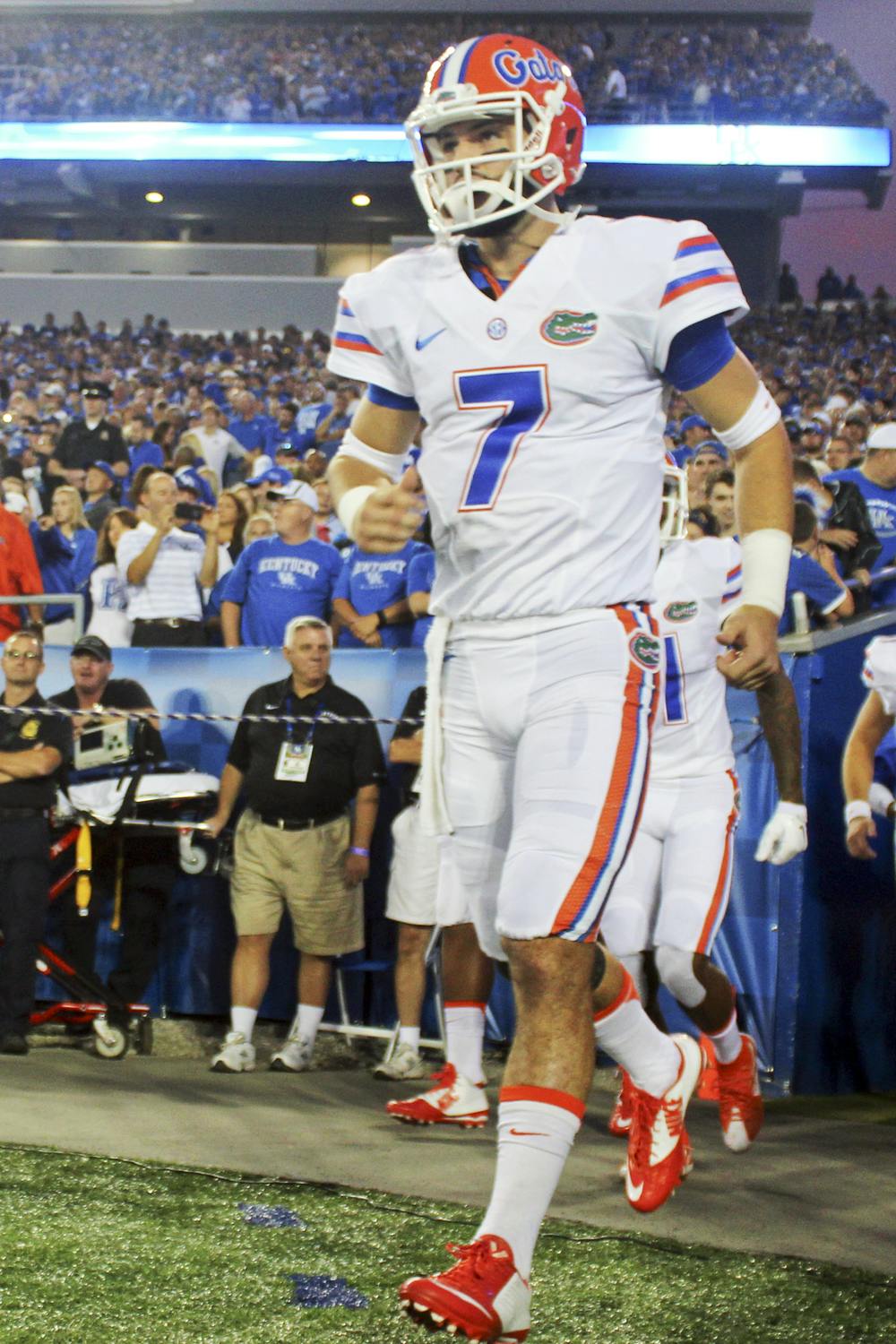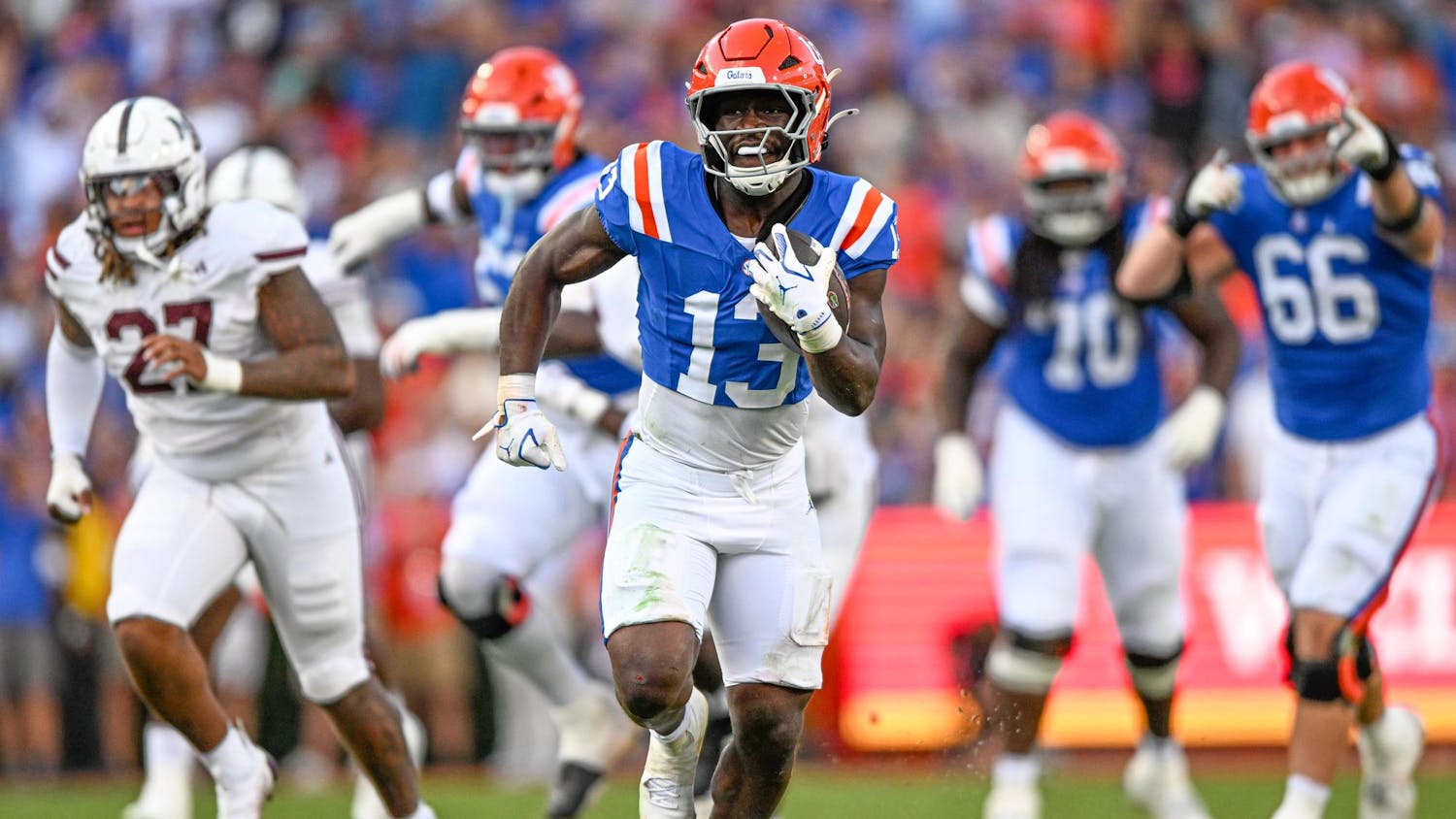"So I took an over-the-counter supplement that had something in it."
Will Grier’s story is one that almost everyone in Gainesville knows by now.
The redshirt freshman quarterback was suspended on Oct. 12 for a full calendar year for violation of the NCAA’s performance-enhancing drug policy.
Grier and UF are in the process of appealing the suspension.
His story stirred the emotions of the entire Gator Nation for days following the announcement of his suspension, most fans disgusted with his fate.
But lost in the ruckus about Florida’s season being in jeopardy and comparisons of Grier’s fate to that of former Florida State quarterback Jameis Winston is the opportunity for a discussion about the severity of Grier’s punishment — a punishment that is potentially career-ending for a college athlete.
The NCAA warns student athletes that supplement manufacturers are not well regulated, so sympathy for Grier isn’t really merited.
What his situation does merit, however, is a conversation.
But right now, nobody seems to want to have it.
Kain Colter and Ramogi Huma, two well-known activists within the National College Players Association, never responded to requests for comment for this story.
Neither did the UF Athletic Association, which only passed along the original story about Grier’s suspension and said it was "the only statement we have on this topic."
The conversation should center around the punishments that the NCAA levies against its athletes, not just for performance-enhancing drugs, but for anything.
And to start such a conversation, one ought to begin by comparing Grier’s sentence to the NFL’s punishment for the same offense.
In late 2012, former Florida standout defensive end Jermaine Cunningham was also caught using performance-enhancing drugs.
As a member of the New England Patriots, Cunningham was suspended for four games by the NFL in accordance with the league’s performance-enhancing drugs procedures.
The former Gator’s estimated salary for that year was $540,000, meaning that he’d miss out on about $135,000.
That’s no chump change to be sure, but four games for a player making six figures is unlikely to be career-ending.
For Grier, missing a full 12 months can have a different and possibly more severe consequence.
He’s missing the rest of his redshirt freshman year, and by the time he comes back next year after Week 6, there will presumably already be an established starter.
Grier will likely have a tough time dethroning whoever is atop the depth chart in the middle of the season, meaning that one and a half years are down the tube.
But Grier is lucky in a sense.
If his suspension stands, he’ll regain eligibility halfway through his redshirt sophomore year.
If he so chooses, he could still play up to two-and-a-half more seasons of college football, giving NFL scouts opportunities to see him in action.
Others conceivably might not be so lucky.
A 12-month performance enhancing drugs suspension for a junior running back who was just seeing the field for the first time pretty much means game over for that player’s hopes of making it to the next level.
Going back to Grier, the NCAA drug testing manual states that supplements can be laced and are not to be trusted. Florida coach Jim McElwain said that the coaches echo this sentiment to their players.
He’s not alone.
• • •
"I did not check with the medical staff before taking it."
Frank Battle, a freshman wide receiver at the University of Connecticut, said the coaching staff is very clear about the use of over-the-counter supplements. even at a smaller D-I school like UConn.
"It’s really strict over here," he said. "When all the freshmen came up here, they told us about all that and they warned us."
The question becomes not whether or not to punish, but what the severity of said punishment should be.
Timothy Vollmer, a member of UF’s department of psychology who specializes in applied behavior analysis, said suspensions are an effective form of punishment.
Vollmer pointed to Major League Baseball’s steroid epidemic being somewhat quelled as the result of suspensions.
"What we don’t know," Vollmer said, "is if a one year suspension has any different effect than a three or four game suspension or a five or six game suspension."
Determining suspension length ultimately falls under the jurisdiction of the different sports leagues.
In professional leagues, like the NFL, the league decides along with the player’s association, which is why the NFL’s suspension rules for first-time performance enhancing drug offenses are considerably shorter than the NCAA’s.
NCAA athletes have no collective bargaining rights, so the length of their suspensions is determined entirely by the powers of the NCAA.
The issue of collective bargaining and compensation in college sports has gained a lot of traction lately, sparked by Kain Colter and his attempt to unionize the Northwestern football team in 2014.
While Colter’s efforts have been stopped cold by the National Labor Relations Board’s decision to decline jurisdiction in the matter — effectively ending Northwestern’s unionization bid — the can of worms that he opened in the public eye is one that has been and will continue to be contentious.
Part of that stems from differing opinions on the issue of collective bargaining and compensation in general.
There are some, like ESPN’s Jay Bilas, who say the NCAA shouldn’t be allowed to profit from the likenesses of athletes without the athletes themselves seeing some of that dough.
There are others who want the athletes to get paychecks straight-up.
There are others still who say the NCAA regulations regarding "improper benefits" need to be changed. Some also say that they don’t want payment, opting instead for guaranteed health coverage and scholarships.
And all of those things could at least be talked about honestly if players had some form of recourse beyond people in their own universities tasked with making their lives easier.
• • •
"I really hope that people can learn from this, learn from my mistake."
Dr. Charles Yesalis, a retired Penn State endocrinologist with an expertise in anabolic steroids, said that if Grier’s story of accidentally taking an over-the-counter supplement is true, there really shouldn’t be so much cause for concern.
"Steroid substitutes over-the-counter, in my strongly held opinion, don’t do anything," he said, adding that while that may be true in his mind, supplements can also be laced.
"It is well established, that is it is not rare — nor did I say it is common — but it’s certainly not rare for over-the-counter supplements to be laced with real anabolic agents that absolutely could cause you to flunk a drug test," Yesalis said.
The process, according to Yesalis, involves "fly by night" companies that spring up, lace their products with anabolic agents, don’t label the products as containing anything illegal, and then eventually get caught and go into hiding, eventually starting up a new business under another name.
"It’s like whack-a-mole trying to catch them."
With such ambiguity surrounding what exactly Grier tested positive for (and in what concentration), it is impossible to determine whether or not his year-long suspension is fair.
Battle said that his own opinion on the matter was to reduce the severity of the punishment.
"I feel like whenever the player commits the offense, it should be, like, the rest of that season. If he did it, like, half the season, he shouldn’t be allowed to play the rest of the season," he said.
But his and every other player’s opinion is as relevant as anyone else’s outside the NCAA (read: not relevant at all).
While the athletes of the NFL, MLB and other professional sports leagues have some of their own looking out for their best interests, NCAA athletes do not.
Cost of attendance stipends, which pay for everyday college expenses like food and laundry in addition to tuition, are a nice thought, and surely student athletes will benefit from them.
However, the student athletes themselves are still victims of a system that often times unfairly profits from the likenesses of players without letting players profit themselves.
While any professional athlete can potentially make millions by signing a sponsorship deal with a company like Nike or Under Armour, college athletes can’t.
Nor can they do things like sell their own autographs or game gear.
Their universities, of course, can.
And maybe that’s the way it should be, but perhaps some players feel differently.
With that in mind, it’s time to have a conversation -- not just about Grier’s suspension, but about the rights of student athletes everywhere to have a say over what they can and can’t do.
"I’m really, really sorry to everyone. Just really sorry."
Follow Ethan Bauer on Twitter @ebaueri
Will Grier runs onto the field during Florida's 14-9 win against Kentucky on Sept. 19 at Commonwealth Stadium in Lexington, Kentucky. West Virginia announced on April 6, 2016, that Grier was transferring to WVU.






